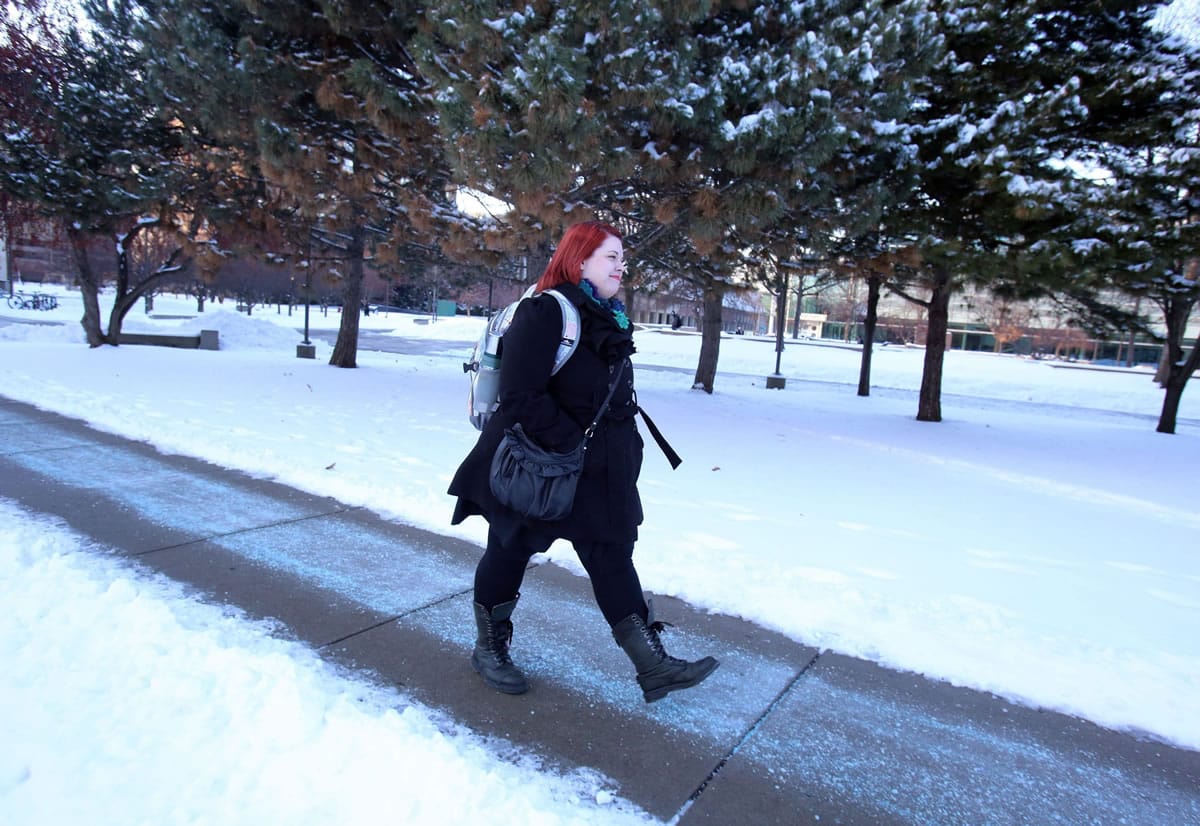DETROIT — The hate mail comes in batches — some short, some rambling, and most laced with words unprintable here.
Go be fat somewhere else, reads one. You are going to die ugly, reads another.
Shame on you and your disgusting bodies.
But it’s the other ones — Thank You, and I thought I was alone, and You saved my life — that keep Amanda Levitt going despite personal attacks (some refer to her vagina, she notes, shaking her head) and even death threats slashing with hate.
All this, because the Wayne State University grad student and founder of www.fatbodypolitics.com defends being fat.
No, it’s more than that, she corrected.
Because she defends the right not to be obsessed with numbers on the bathroom scale.
She defends anyone who doesn’t fit into the narrow margins society has prescribed for femininity and health.
And she defends beauty in any shape and size.
It’s not always an easy sell in a world where clothing giant Abercrombie & Fitch has long refused to carry clothing in larger sizes because, according to its CEO in a 2006 interview: “Candidly, we go after the cool kids.”
And in 2013, a fitness enthusiast mom was banned from Facebook because of what some called a rant denouncing an ad suggesting heavy women can be sexy. Meanwhile, People for the Ethical Treatment of Animals, or PETA, has come under fire for trying to encourage vegetarianism by running ads of obese women or slogans like “Lose the blubber: Go Vegetarian.”
Levitt, 28, takes to Twitter and Tumblr and other social media. If America is really getting fatter as research suggests, she said, it’s most likely that an obsession with being thin and a culture of fat-shaming leads to yo-yo dieting and destructive self-hate, she said.
It’s something to remember as Americans stare into their mirrors and begin incorporating New Year’s resolutions.
Genetics and lifestyles are different, Levitt said: “Why can’t we be allowed to be happy with ourselves?”
Here’s a thought, she says: “Far better to ring in the new year with a resolution to not be a jerk.”
Research suggests Levitt is tackling something systemic.
First, categorizing people as healthy only by BMI and jeans size is misguided, according to health professionals.
“You can be a thin person and not be healthy at all, and you can have all kinds of healthy habits and not be thin,” said Liz Oliver, a registered dietician who coaches clients at the Oakwood Physical Therapy & Wellness Center in Dearborn, Mich.
There are more accurate ways to measure health: blood pressure and cholesterol levels and even the number of hours we sleep at night, for example, Oliver said.
Secondly — and this is where Levitt is concerned the most — oversimplifying health by body shape may fuel what some say is the last acceptable form of discrimination.
Studies suggest heavier job applicants are more likely than their thin counterparts to be passed over for jobs. Fat defendants may be more likely than thin defendants to be found guilty. Fat doctors are seen to have less credibility, according to some studies.
It’s reinforced in not-so-subtle ways every day, said Rebecca Puhl, Rudd Center for Food Policy & Obesity at Yale University.
Consider some of the most popular shows or movies today, she said.
“We see a very consistent pattern that overweight characters are … often the butt of jokes where the thin characters and even underweight characters are the ones seen as funny and successful,” she said.
Even doctors — with all their education and the presumed better understanding of human nature because of the broad spectrum of patients they see — tend to have less trust that fatter patients will stick to doctor’s orders.
“This is a socially acceptable form of bias. We see it in all aspects of our society and reinforced in the media. There’s no reason to think that doctors would be immune to that,” she said.
Levitt sees the cruelty nearly every day on her laptop screen.Levitt took to her keyboard.
“I don’t think it’s necessarily that I’m angry. But I think that people are not used to people telling you point blank that you’re wrong,” said Levitt, who calls her website “an idealistic diatribe from a fat feminist.”
She scrolled through some of the more than 2,000 e-mails, tweets and other “fat-bashing” messages she has collected over the years.
“Please do the world a favor and eat a bullet,” one said. Levitt has been steeled against such hate; not everyone is, she said.
“The only way you can react to that is be sad,” she said.
On a personal level, Levitt knows the pain that’s involved.
Levitt was a child model, her pictures appearing in local toy ads. Pageants meant flights across the country, tony venues, dress-up and time spent with her mom, Cheryl, whom she calls her best friend.
“I really liked being pretty. … I was constantly getting positive reinforcement for being beautiful,” she said.
But adolescence reshapes bodies.
In sixth grade, she had no context. Just insecurity and hurt.
And a well-meaning relative who took her aside one day: You’d be so pretty if you were thin.
“That’s when it cemented that something was wrong with me,” Levitt said.
It wasn’t until college that Levitt said she was able to reframe her experience into one that had been manipulated by others’ expectations.
At Wayne State University, she’s researching the hate mail and its effect on social movements.
Levitt recently addressed “selfies,” posting several of herself — blaring orange lipstick in one, an extended middle finger in another.
“Being visible isn’t mandatory; it’s a process that sometimes we aren’t ready for or want to be part of. … I still feel that way some days. The most important thing is living how you want to, not allowing others to attempt to change or dictate how you do it.”



